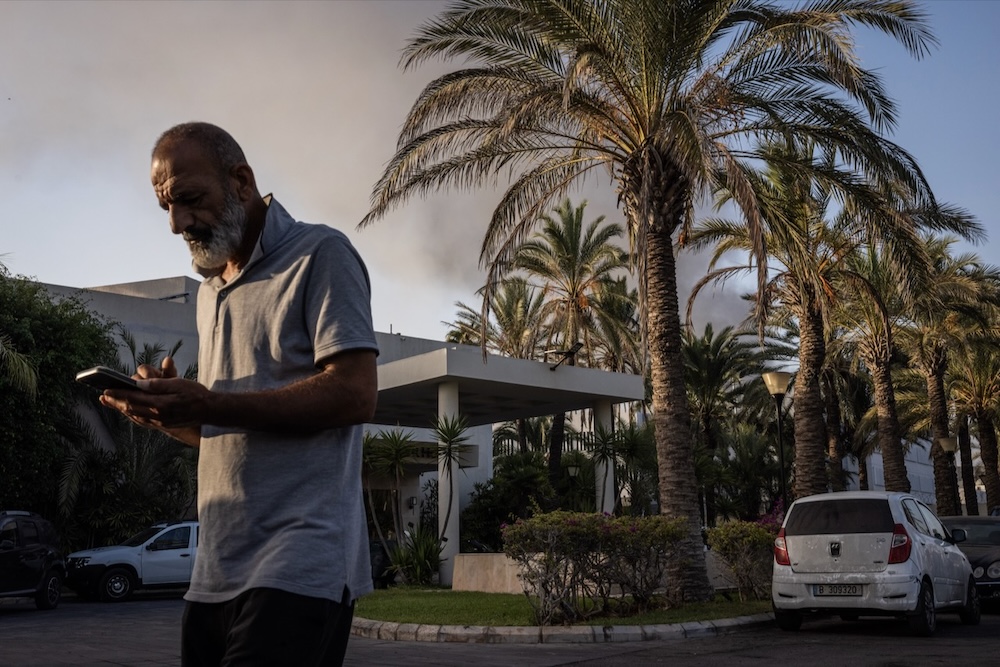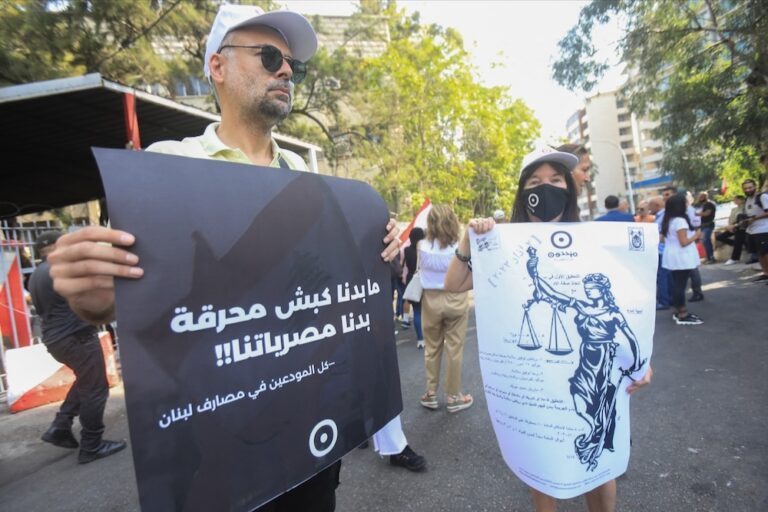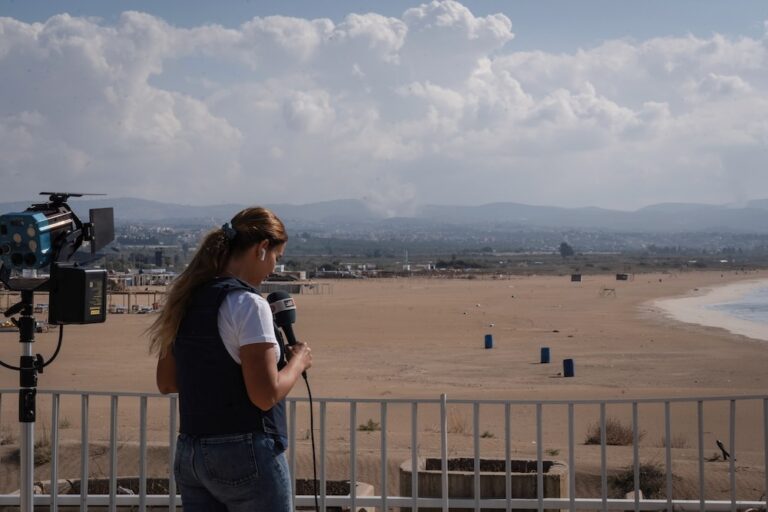Amid AI-driven shifts in the information landscape, stakeholders at the Lebanese Internet Governance Forum push for modern media laws balancing digital security and free expression.
This statement was originally published on maharatfoundation.org on 12 February 2025.
Maharat Foundation organized a session on “Safeguarding Digital Safety and Human Rights in the Lebanese Context” featuring MP Razi El Hajj, Dean of the Faculty of Humanities at NDU Dr. Maria Bou Zeid, lawyer Farouk Al-Moghraby, and moderated by journalist Edmond Sassine. The session took place on Wednesday, February 12, at 11:00 AM at the Faculty of Engineering, Saint Joseph University, Mar Roukoz.
This session was part of the Lebanese Internet Governance Forum (LIGF), which was held on February 11-12, 2025, under the theme “Shaping a Resilient and Equitable Digital Ecosystem for Lebanon.” The forum brought together stakeholders from the government, business sector, civil society, technical community, academia, international and regional organizations, policymakers, and experts in internet governance in Lebanon.
The session focused on the importance of adopting modern laws and frameworks that balance digital security, freedom of expression, and human rights. It emphasized the need to move away from managing the media sector with a traditional media mindset and to develop new media law drafts that take into account artificial intelligence rather than solely focusing on freedom of expression, despite its significance.
Regarding digital transformation, the participants in the session emphasized that digital security is essential, particularly the issue of protecting users, who represent the weakest link, while governments and companies exercise their control. They also highlighted the importance of the role of universities and specialists in providing policymakers with their expertise and drawing from the experiences of other countries to implement them in the Lebanese context.
The participants pointed out that a digital transformation strategy requires an independent specialized body to oversee the matter. Additionally, it is crucial to establish the foundations of digital education in school curricula to drive social change. Even if this cannot be achieved through legislation, it should at least be accomplished by creating awareness among users about their rights and responsibilities to foster change.
Razi El Hajj
MP Razi El Hajj emphasized that Lebanon Digital Transformation aims to establish a sustainable and effective digital transformation. He highlighted that this process is challenging and requires continuous follow-up, but most importantly, it demands a political decision. He stated that he would present this issue as a key demand when meeting with Presidents Aoun and Salam, stressing the importance of implementing digital transformation through scientifically sound methods. Regarding digital transformation projects, MP Razi El Hajj pointed out that many draft laws were discussed but never completed. He noted that Lebanon currently has 83 electronic and digital daft laws that have not been finalized nor implemented. He also emphasized the common confusion between electronic and digital initiatives, stressing that they are two distinct concepts that should not be mixed.
Maria Bou Zeid
Dr. Maria Bou Zeid, Dean of the Faculty of Humanities at NDU, pointed out that while the world has advanced in regulating artificial intelligence, legislative drafts in Lebanon still focus on criminalization issues. She emphasized that Lebanon is falling behind in its approach to media and technology laws. Bou Zeid also stressed that digital security is crucial, particularly in countries where the rule of law is weak, and user protection is essential.
Farouk Al-Moghraby
Lawyer Farouk Al-Moghraby, speaking about the parliamentarian subcommittee discussions on the new media law, noted that the subcommittee includes competent experts and engaged civil society representatives. However, he cautioned against approaching the issue with a traditional mindset, emphasizing that the world is evolving rapidly, and Lebanon must adapt.
Al-Moghraby emphasized that the longer the draft media law remains unapproved, the more amendments it will require to stay relevant. He noted the ongoing debate on balancing freedom of expression with the protection of personal dignity. Regarding the detention of journalists, he pointed out that the issue lies with the Public Prosecutor’s Offices, which impose defamation and slander penalties beyond their jurisdiction.
Roula Mikhael
During an intervention in the session, Roula Mikhael, Executive Director of Maharat Foundation, underscored that media laws should not be limited to freedom of expression issues but must also address the technological sector. She highlighted the importance of media literacy in this context. Mikhael also called for reforming the internal regulations of the Parliament to enhance the work of parliamentary committees and stressed that laws should be passed in their general framework first, with details addressed later.
The session concluded with a set of key recommendations, including:
– Seizing the current political momentum to pass a comprehensive and modern media law.
– Leveraging research, studies, and the expertise of Lebanese universities to advance the media sector.
– Abolishing criminal penalties for journalists, especially those related to social media publications.
– Replacing the Publication Court with a specialized judicial body composed of civil chambers to handle publication-related cases.
– Creating a new legislative dynamic within Parliament to ensure more effective lawmaking.
– Encouraging collaboration between policymakers and experts in drafting media laws to benefit from shared expertise, while ensuring technical support for parliamentary committees and the legislature.
– Learning from international experiences and adapting best practices to fit Lebanon’s specific context.
– Establishing a competent and independent body to oversee and develop the digital sector in the long term.
– Setting a legal framework for artificial intelligence (AI) to regulate its impact on media and society.
– Forming a high-level committee on digital transformation that includes government ministries, experts, universities, and specialized organizations.
– Ensuring digital security and user protection, recognizing that users remain the weakest link while governments and corporations exert control.
– Reforming Parliament’s internal regulations to enhance the efficiency of legislative committees and prioritize passing laws in their general framework first, with details addressed later.
In addition, “Maharat News – Fact-o-meter” team organized a training workshop on fact-checking as part of the forum on Wednesday, February 12. The workshop covered the Maharat News fact-checking methodology and introduced various tools that can be used for verifying information. It also showcased examples of Misinformation that were fact-checked during the war period, in relation to the importance of safeguarding information in the digital space, particularly amid rapid technological advancements and the influence of artificial intelligence on the information landscape.



